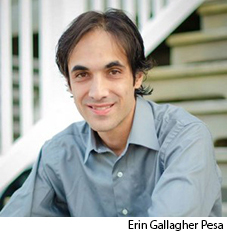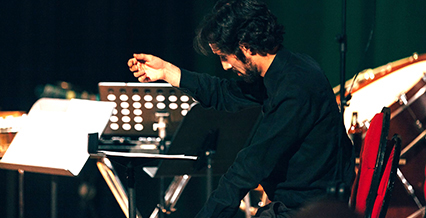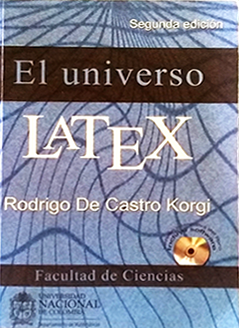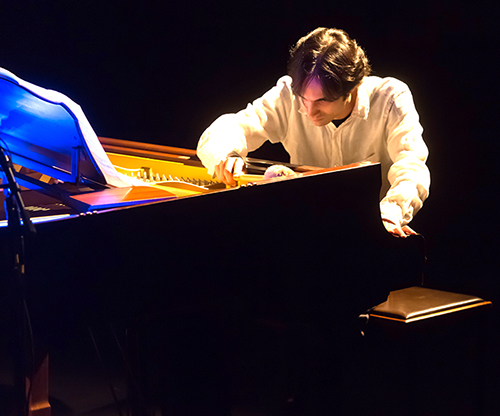 [completed 2016-08-17]
[completed 2016-08-17] Federico Garcia-De Castro is a composer of music, passionate for chess, and a lover of TeX.
 [completed 2016-08-17]
[completed 2016-08-17]
Federico Garcia-De Castro is a composer of
music, passionate for chess, and a lover of TeX.
Dave Walden, interviewer: Please tell me a bit about yourself.
Federico Garcia-De Castro, interviewee: I was born and raised in Bogota, Colombia. I was a pretty normal child, but I pursued a couple of interests from an early age — I went to the conservatory for a couple years, before that conflicted with math Olympiad training and I decided to do math. I'd return a couple of years later, as I remember out of curiosity and a vague remembrance that it (music) had actually been interesting. Math still figured at the top, though, but then eventually I left math to devote myself to chess, which was my life pretty much between 11 and 16. And, studying chess, I started listening to music (while studying openings, tactics, etc.), and that's when I got hooked on music. In the end, at 16 I decided music — composition — was my thing.
So my mom, who had been the one pushing for my early music training (and hated that I quit for math, and later hated much worse that I quit math for chess!), ended up winning that one. The one who lost, however, was my uncle Rodrigo De Castro. A mathematician, uncle Luli was in Chicago for seven years before returning to Colombia in 1993, when I was 15. He's also a huge music aficionado and connoisseur, and was the one who triggered my teenage interest in music… always trusting that I clearly was going to be a mathematician. He's most relevant here, however, because in 1993 he brought TeX to Colombia.
Now, a digression for context: some four years ago I was visiting Bogota, and went through some notebooks and papers and things my mom had kept from our childhood years. (That is, mine and my brother's; Nicolás is two years younger, and now a German philologist; he writes amazing poetry on the side, and I have set a couple of his poems to chamber works.) In those childhood archives I found a small slip of paper, which had, written clearly in a child's handwriting, some 10 lines of a program — in BASIC. This discovery, and some things it made us all remember, helped me, as an adult, understand a lot of my life in a new light. Whatever I did as a child, whatever I pursued, whatever courses I enrolled, I was always, and have always been, foremost a programmer. In the wide sense: what else is a music score? No more and no less than a program — a series of instructions, written in a code (with its own syntax that you have to learn, etc.), that will be executed. And then debugged. A musical work is not exactly analogous to an algorithm, but even so, what a composer does is programming.
My relationship with composition has always been tense (as probably anyone's is — nothing special there). When I came to the United States, for PhD in composition at Pitt in 2001, I also “discovered” musicology, and I did much more musicology than composition. From that time stems the motivation for my first LaTeX packages.
DW: Let's talk about them later.
FGDC: Then eventually between 2005 and 2009 I was really devoting myself to chess — in 2009 I won, amazingly, the Pittsburgh Chess Club championship and the informal “state” tournament at Carlisle, PA. That's where the TeXmate package stemmed from. Soon after my graduation in 2006 I co-founded a contemporary music organization, which has since grown stronger and stronger. That meant for years I flirted seriously with a career in conducting....

It's like I always looked for something to do, something to be, other than a composer.... That's why it was so important to me to understand, as mentioned above, that I am mainly a programmer, and that my interest in composing is of the same nature. Composing, I've since also figured out, is just much harder and much scarier (among other things, you don't have the luxury of constant feedback through test runs). But it is what I am, period.
DW: How did you first come in contact with TeX?
FGDC: So in 1993 I ran into TeX. Then I only had an {Atari 130 XE}, which I got after months and months of pleading to my parents because I wanted finally to be able to program on a computer, not on slips of paper… (also, my parents couldn't readily afford a computer right away, that was the reason for the wait). I had no PC to run TeX on in 1993, but I have the vivid memory of being in a class in school and writing out the TeX document that would produce whatever the textbook we were looking at was. I'd write it on the left side of the notebook; on the right, I'd calligraph out what would have been TeX's output. This was in 1993, just when I got to know TeX and was hooked enough that I had to do it even on paper :) That summer a colleague of my uncle hired me to typeset his math book. I remember too the frustrating moments with ! Extra messages, and my uncle coming to my rescue (I worked at my uncle's place — I did not have a PC!) when the tears were starting to come.
Back then, AMS-TeX was the thing. (In fact, my uncle had brought with him the LaTeX manual, but he had never used LaTeX and only vaguely told me what it was. I borrowed the book. I was the one who told my uncle (!) that LaTeX was onto something....) The point is that, for me, names like Spivak, Mittelbach, Rahtz, etc., were the same as names like Mozart, Beethoven, Brahms.
This last one with an h; Braams would also become like that when my uncle kept writing LaTeX manuals for Colombian (and Spanish-speaking) TeX users, with which I helped him. In 2002, I think, El Universo LaTeX featured a CD with examples and summaries — in PDF, done by me, with color syntax highlighting and plenty of hyperlinks — a lot of fun with \verb. Years and years later, when working seriously on my most complicated program (TeXmuse), I looked back at this code, when I wanted to add syntax highlighting to the LaTeX docstrip system — what eventually became the colordoc package.

In 2011, I think, Frank Mittelbach (Beethoven!) got in touch with me to include TeXmate in the second volume of the LaTeX Graphics Companion. And then I met him, in Boston in 2012. A couple of weeks ago (as of this writing) I had multiple beers and chats with him in Toronto.
DW: When you say that your uncle brought TeX to Colombia, do you mean to you personally or basically to all Colombia?
FGDC: To all Colombia. He basically brought TeX with him when returning from his time in the US (PhD in math at Champaign Urbana). At around the same time TeX was also brought into the community centered on another person (I can't remember his name), who was associated with the Math Olympiads. But my uncle brought it to the National University, much more central in the math community. And then he immediately started writing booklets, manuals, etc., that people needed in order to learn. I remember he even did one on PiCTeX. And a full booklet for tables, which of course were a problematic subject in TeX. And so on.
DW: Is your uncle still alive and promoting TeX?
FGDC: He's still active at the math department. Demand for TeX manuals declined once most people know how to use it and with the availability of everything online these days. But I'm sure copies of that book are still sold every once in a while today.
DW: You mentioned TeXmate. What other things have you implemented in TeX. (I know you have written about some of them.)
FGDC: Here's a list:
DW: Yes, I have read your papers on TeXmuse: On musical typesetting: Sonata for TeX and Metafont, Op. 2, and TeX and music: An update on TeXmuse. I'd like to come back to TeXmuse. How about TeXcel, which you presented at TUG 2016?
FGDC: TeXcel is a set of macros I developed this spring for financial tracking and reporting for my contemporary music company. It was a fun project, a nice excuse to program (go back to hacking TeX), with a clear and manageable goal. It is a complete and robust system, but it simply does what it does: helps in reporting financial information for my organization. It is certainly the backbone of what conceivably would be a more “public” and general purpose package; and, inasmuch as it was a kind of discovery (in the sense that who would have thought that TeX was more appropriate for this than a spreadsheet), it was an interesting presentation for the TUG meeting. But I would not count it next to the packages above that are meant for general use by general users without much further hacking.
DW: Let's return to your composing. Is it possible to label the kind of music you write, and who are your musical influences (in addition to your uncle)?
FGDC: The genre is usually called “new music”. But for someone who doesn't already know what that means, it doesn't mean much. Lately I've said “contemporary chamber music”. That gets it across.
I think Mahler and Beethoven are the greatest composers in history. At one point I was a devoted Bachian (I even published a scholarly article on his Italian Concerto), but I have since matured, hehe.
All that said, it is when I listen to Luciano Berio, Witold Lutosławski, and George Crumb that I remember why I am a composer.
DW: Might you give us an example of each of these composers that is in any sense representative of their compositions? Perhaps I can listen to them via YouTube.
FGDC: Crumb's Makrokosmos series (the first one is for solo piano, then he wrote one for amplified piano, then the masterpiece volume III for two pianos and two percussionists, and finally one for amplified piano four hands) is in my view among the highest creations of the human mind in any area. Crumb's music is unmistakable, but in a very open way: it's prolific in his influence on other composers (in the 80s, for example, it swept through Latin America and everyone was writing like him for a while, in the good sense), unlike, for example, Messiaen's, who sounds like Messiaen to the point that it came to be a kind of dead end with no more to be explored there.
Berio's Laborintus II is a piece that also fills me with admiration. This coming spring (I can barely believe it), I am producing and conducting the Pittsburgh premiere of the piece (which is very ambitious: 17 instruments, 8 actors/speakers, 3 solo sopranos, narrator, and electronics) as part of a residency with Chicago-based vocal ensemble Quince. This has been more of a dream than a goal for me; until it became a possibility last year, it was simply too unthinkable.
Lutosławski's music is certainly my biggest influence. I think the piano concerto is second only, maybe, to Beethoven's Emperor. His cello concerto, his third symphony, and his string quartet are towering exemplars of each genre. His music is relatively conservative in format (most of it for orchestra, which is a 19th-century instrument), if not in its amazing content; and this has meant that he's a little less “sexy” than more fashionable contemporaneous names, notably Ligeti. But everyone agrees Lutosławski is a giant.
DW: On your website, I see full scores for some of your compositions. How do you do your composing — musical instrument, music paper and pencil, instrument and music notation program, or directly into a music notation program (e.g., TeXmuse)?
FGDC: It really depends on the piece, the project, the kind of idea I'm struck by. I just finished a guitar piece, that's inspired by a Cuban trova song (Pedro Luis Ferrer's Romanza de la niña mala). You can think of it almost as a translation into a new language (in my piece, the guitar is tuned in microtones; and in addition it has no lyrics, it's just the guitar part). The process was: passage by passage, listen to the original, then find the right “translation” on my guitar; I'd then lock the left hand in position, so as to not lose the chord, and quickly scribble it down with my right hand on my notebook. But not all the details — those would be added simply when (next step) I'd type the notes into the computer. On the other hand, I've been composing a piece for six harps placed around the audience; in this case I have no instrument to find chords on and the piece is really about the surround effect, so exactly what notes I write is really a minor point. For this there's mainly a huge “research” stage that's really about discovering what the piece is about, and I am a long way away from even knowing what the best notation will be for it — so the computer is useless at this point.

The question, I think, touches on the relationship between the notebook and the computer. Do musicians have it all in their heads? Do they figure it out on paper? Do they use the computer for it? All understandable questions, but in a way they are illusory: would you ask a novelist, or a scholar, whether they write first on paper and then type it up? The answer in that case is not only obvious (take notes as needed on paper, but go ahead and use the computer for the actual text), but also not very interesting. Well, I hate to say it, but writing music doesn't carry any more mystery about it than writing words!
DW: Please compare your TeXmuse music transcription with other programs, for example, Finale, Sibelius, MusiXTeX, or Lilypond.
FGDC: The most important aspect and uniqueness in TeXmuse's approach is that it is all about keeping the act of typesetting music as close as writing it by hand as possible. In several respects: if you're, say, in c-minor, you don't write the flat next to each e, even though you mean it (because that's part of what being in c minor means). This is the major deficiency of Lilypond — a very complete system, but with a syntax and an approach so autonomous from the musician's mind that it's a chore more than a help.
TeXmuse also features some algorithms that were pursued in the belief that mechanical tasks are exactly what computers are for. In music, in particular, pitch spelling (including transposition) and line breaking are areas that are largely mechanical but that have been left alone by music typesetting software. Among the two of them they consume the biggest (and unacceptably big) portion of a composer's time these days.... It was this frustration that led me to think of TeX for music typesetting. And it was so high on my priority list that I tackled those two algorithms very early on: if they were not going to be possible, then the rest would not be worth it.
In recent times there have been advances. I follow from a distance, but from what I have seen MusicXML is very good, there are serious people doing serious research on all of this. (I'm still not aware of anyone tackling the spelling problem, though.) It's part of the reason why I haven't continued working on TeXmuse (in addition to time, my “real” responsibilities, etc.): that space is in a sense crowded now, and crowded with good efforts. As a system, and thinking of the user's experience, TeX (sadly) is not really the most promising environment; I don't see the whole musician community installing and deciphering TeX.
TeXmuse can still be a contribution at some point: as a front end to the other systems that have been developing. At this point in TeXmuse, TeX takes the user's input (and this is its strength) and from it, it makes Metafont programs that produce the music. There's no reason why TeXmuse's input couldn't be something other than Metafont (for example, Lilypond, or MusicXML). In fact, this is probably much much easier than programming Metafont automatically!
DW: Please say something about Alia Musica and the new music festival it sponsors, e.g., how and why were they founded, how does it help you (or the world) for you to spend time as artistic director and obviously doing lots of less artistic work to keep them functioning?
FGDC: In the last 15 years or so (I lived here since 2001), Pittsburgh has been going through a major cultural renaissance. Even when I got here the city was far from its infamous past as a dirty steel midwest town, and had already shifted to things like the health system (the biggest industry in Pittsburgh, through the University of Pittsburgh Medical Center), high-tech research (mainly at Carnegie Mellon University) and eventually high-tech industry. But culturally it's been a thing of the last decade or so. I founded Alia Musica with another 10 emerging composers in 2006–7. The main reason was that there were really no professional outlets for the work of young composers in the city, and in fact there was little visibility, little funding, and little interest. In a word, we realized that since no one was playing our music we would have to do it ourselves. A lot has changed, and it's continuing to change. Some things lag behind (funding, media attention) but they're catching up. In any case, the contemporary chamber music scene is much larger, and not only in quantitative terms. More and more young people (and that includes, simply statistically, artists, and within them musicians) are either moving in or (perhaps more relevantly in a city with a long tradition of excellent music performance schools) staying after advanced studies.
I was reflecting on this during an interview I did for the new-music blog “I Care If You Listen” on the occasion of the 2016 edition of the Pittsburgh Festival of New Music (PFNM), a production of mine and of Alia Musica's in May 2016. As I was saying, when we started there wasn't much devoted to cultivating the creation and appreciation of new music in the city (and that's why we started; and, by the way, we were not the only ones that started more or less at that same time). By contrast, at PFNM 2016 one of the performances was a showcase of current new-music activity in Pittsburgh, for which I had to select groups. I had “room” for seven, and I had to make a choice, and it wasn't easy. New initiatives pop up, some die, some endure, but the general sense is of vibrant activity. Alia Musica itself has in a way grown out of its original mission of performing Pittsburgh composers; other younger initiatives have taken that role. Alia Musica has been able now to shift its focus, from making an impact on the careers of emerging musicians, to making an impact on the actual life experience of its audiences. So, for example:
I should mention one more thing, namely, one of the young ensembles just founded, NAT 28. I have been in touch with them in regards to my 10 years of professional activity as a composer in Pittsburgh. As part of the celebration, NAT 28 is going to devote a full concert to my music this November. A “portrait concert”, the dream of any composer. They are bright young musicians, recent graduates in performance, and beyond (or before) plans for this concert I have had nothing to do with their formation. I take this as a sign that the seeds planted by Alia Musica (among many seeds planted by others as well) are in fact taking root and producing on their own. Personally, it is also one more gift I get from Pittsburgh — like the right grant that I've gotten at the right time for the right new idea, effectively the mechanism by which I've stayed, year after year, and based my career in what is an increasingly central city.
DW: Thank you for taking the time to do this interview. You've mentioned a lot of new music I need to listen to.